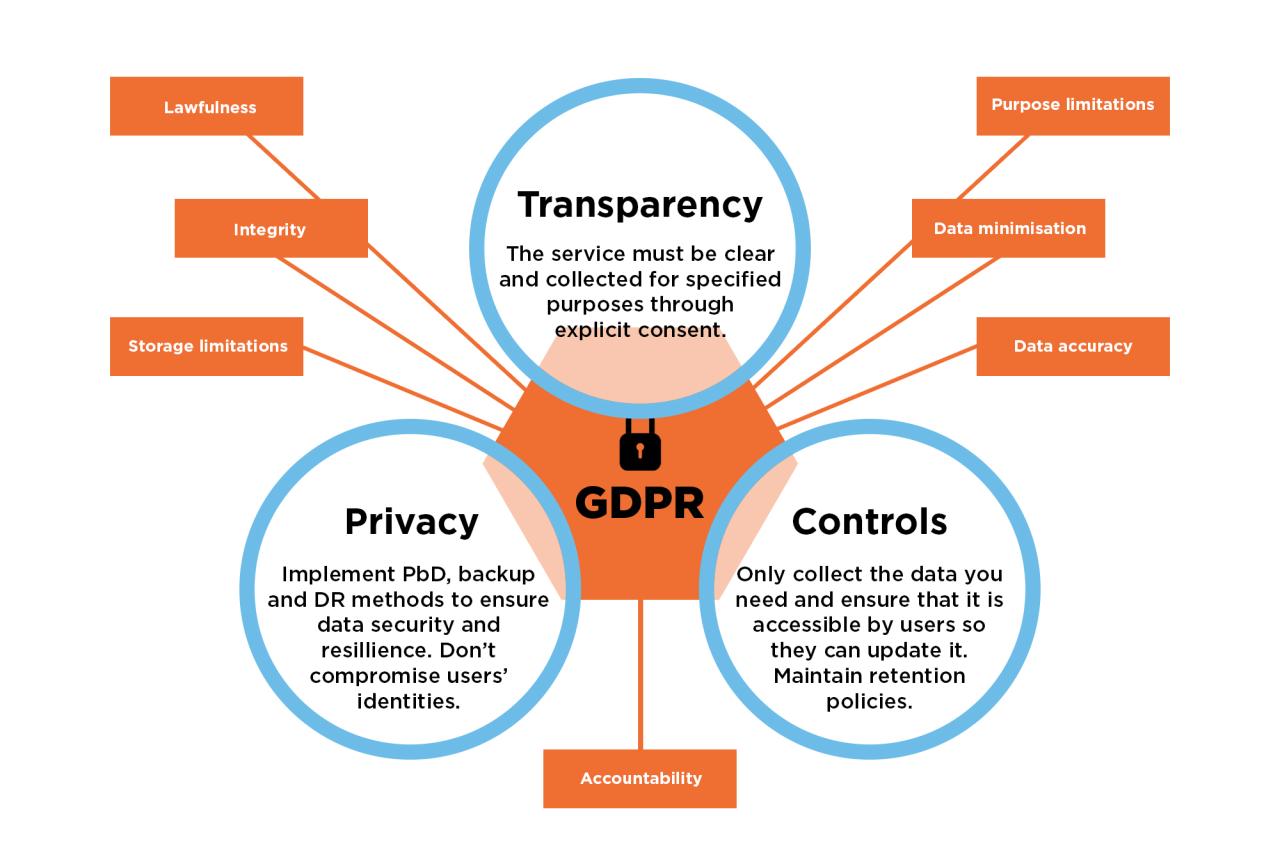In the digital age, WhatsApp has become an indispensable communication tool, connecting billions worldwide. However, with the vast amount of personal data we entrust to the platform, it’s crucial to understand how WhatsApp’s data privacy policies impact our user rights.
This comprehensive guide will delve into the intricacies of WhatsApp’s data collection, security measures, data sharing practices, and user controls, empowering you to make informed decisions about your privacy.
WhatsApp’s data privacy policies are a complex tapestry of legal obligations, technical safeguards, and user choices. Navigating this landscape can be daunting, but we will break down each aspect into digestible chunks, providing you with a clear understanding of your rights and responsibilities as a WhatsApp user.
User Rights and Data Collection
WhatsApp collects various types of data from its users to provide its services and improve the user experience. This includes:
-
-*Personal information
Name, email address, phone number, and profile picture.
-*Usage data
Information about how you use WhatsApp, such as the frequency and duration of your calls, messages, and status updates.
-*Device information
Information about the device you use to access WhatsApp, such as the make, model, operating system, and IP address.
-*Location data
Information about your location, which can be collected when you use WhatsApp’s location-sharing feature.
-*Contact information
Information about your contacts, such as their names, phone numbers, and email addresses.
WhatsApp uses this data for a variety of purposes, including:
-
-*Providing its services
WhatsApp uses your personal information to create your account and provide you with access to its services. It uses your usage data to improve the quality of its services and to personalize your experience. It uses your device information to ensure that WhatsApp is compatible with your device and to provide you with support.
-*Improving its products and services
WhatsApp uses your data to improve its products and services. For example, it uses your usage data to identify areas where it can improve the performance of its app. It uses your feedback to make changes to its features and design.
-*Marketing and advertising
WhatsApp uses your data to market its products and services to you. For example, it may use your usage data to send you targeted ads for WhatsApp-related products and services.
-*Security and fraud prevention
WhatsApp uses your data to protect its users from security threats and fraud. For example, it uses your device information to identify suspicious activity and to prevent unauthorized access to your account.
Here are some examples of how WhatsApp uses your data:
-
-*To personalize your experience
WhatsApp uses your usage data to personalize your experience. For example, it uses your usage data to recommend contacts that you may want to add to your contacts list. It uses your location data to provide you with local information and services.
-*To improve its products and services
WhatsApp uses your data to improve its products and services. For example, it uses your usage data to identify areas where it can improve the performance of its app. It uses your feedback to make changes to its features and design.
-*To market its products and services
WhatsApp uses your data to market its products and services to you. For example, it may use your usage data to send you targeted ads for WhatsApp-related products and services.
-*To protect its users from security threats and fraud
WhatsApp uses your data to protect its users from security threats and fraud. For example, it uses your device information to identify suspicious activity and to prevent unauthorized access to your account.
Data Security Measures

WhatsApp employs a robust security framework to safeguard user data from unauthorized access, data breaches, and other cyber threats.
These measures include encryption, data storage practices, and regular security audits.
Encryption
WhatsApp utilizes end-to-end encryption, which ensures that messages, photos, videos, and other data shared between users remain private and inaccessible to anyone except the sender and recipient. The encryption keys are generated and stored on the user’s devices, making it virtually impossible for third parties, including WhatsApp, to decrypt the data.
Data Storage Practices
WhatsApp stores user data on secure servers located in various countries around the world. The data is encrypted both in transit and at rest, minimizing the risk of unauthorized access. WhatsApp also employs data retention policies to ensure that user data is not stored indefinitely.
Security Audits
WhatsApp regularly conducts security audits to identify and address potential vulnerabilities in its systems. These audits are performed by independent security firms and help ensure that WhatsApp’s security measures are up-to-date and effective.
Potential Vulnerabilities or Risks
While WhatsApp’s security measures are robust, no system is completely immune to security risks. Potential vulnerabilities include:
- Malware: Malware can infect user devices and compromise WhatsApp’s security measures.
- Phishing: Phishing attacks can trick users into providing their WhatsApp credentials or other sensitive information.
- Unpatched software: Outdated software can contain vulnerabilities that can be exploited by attackers.
To mitigate these risks, WhatsApp recommends that users keep their devices and software up-to-date, be cautious of suspicious links or attachments, and use strong passwords.
Data Sharing and Third Parties
WhatsApp shares data with several third parties, including Facebook, its parent company, and other companies that provide services to WhatsApp, such as cloud storage and payment processing. The data shared with these third parties is used for a variety of purposes, including improving the WhatsApp service, providing customer support, and conducting research and development.There
are some concerns and risks associated with WhatsApp’s data sharing practices. One concern is that WhatsApp’s data sharing practices could allow third parties to access users’ personal information, such as their phone numbers, contact lists, and message history. This information could be used for a variety of purposes, such as targeted advertising or identity theft.Another
concern is that WhatsApp’s data sharing practices could allow third parties to track users’ activities on WhatsApp. This information could be used to build a detailed profile of users’ online behavior, which could be used for a variety of purposes, such as targeted advertising or discrimination.
WhatsApp shares a significant amount of data with Facebook, its parent company. This data includes users’ phone numbers, contact lists, message history, and location data. Facebook uses this data to improve its own services, such as targeted advertising and friend recommendations.There
are some concerns about WhatsApp’s data sharing practices with Facebook. One concern is that Facebook could use this data to track users’ activities across multiple platforms, such as WhatsApp, Facebook, and Instagram. This information could be used to build a detailed profile of users’ online behavior, which could be used for a variety of purposes, such as targeted advertising or discrimination.Another
concern is that Facebook could use this data to target users with advertising. This advertising could be based on users’ personal information, such as their age, gender, and location. This advertising could be intrusive and annoying, and it could also lead to users being targeted with scams or other malicious content.
Data Retention and Deletion

WhatsApp generally retains your account information for as long as your account is active or as needed to provide you with services. However, certain types of data may be retained for longer periods of time, such as:
- Message logs: WhatsApp retains message logs for a limited period of time. The default retention period is 30 days, but you can choose to increase this period to 90 days or 1 year.
- Media files: WhatsApp retains media files (such as photos and videos) for a limited period of time. The default retention period is 90 days, but you can choose to increase this period to 1 year or 2 years.
- Backup data: WhatsApp retains backup data for a limited period of time. The default retention period is 1 year, but you can choose to increase this period to 2 years or 5 years.
Deleting Your Data
You can delete your WhatsApp account and all of your associated data at any time. To do this, open WhatsApp and go to Settings > Account > Delete my account.
- Please note: Deleting your WhatsApp account will permanently delete all of your messages, media files, and backup data. It is important to back up your data before deleting your account.
Implications of Data Deletion
Deleting your WhatsApp account will permanently delete all of your associated data. This includes:
- Your message logs
- Your media files
- Your backup data
- Your account settings
Once your account is deleted, you will not be able to recover any of your data.
Privacy Settings and Controls
WhatsApp provides users with a range of privacy settings to manage how their data is collected, used, and shared. These settings allow users to control the visibility of their personal information, such as their profile picture, status, and last seen timestamp.
Adjusting Privacy Settings
To adjust privacy settings, users can access the “Privacy” section within the WhatsApp settings menu. Here, they can configure the following options:
- Profile Picture: Choose who can see your profile picture (Everyone, My Contacts, Nobody).
- About: Control who can view your “About” status message.
- Last Seen: Set who can see the time of your last activity on WhatsApp (Everyone, My Contacts, Nobody).
- Status: Choose who can view your WhatsApp status updates.
- Read Receipts: Disable read receipts to prevent others from knowing when you have read their messages.
- Live Location Sharing: Manage who you can share your live location with and for how long.
By adjusting these privacy settings, users can tailor their WhatsApp experience to suit their privacy preferences.
Legal and Regulatory Compliance
WhatsApp is subject to various legal and regulatory requirements worldwide. These include data protection laws, privacy regulations, and telecommunications laws. WhatsApp complies with these requirements by implementing appropriate data protection measures, such as encryption, data retention policies, and user consent mechanisms.
Compliance with Data Protection Laws
WhatsApp complies with data protection laws by implementing measures such as:
- Data encryption to protect user communications
- Data retention policies to limit the storage of user data
- User consent mechanisms to obtain user consent for data collection and processing
Compliance with Privacy Regulations
WhatsApp complies with privacy regulations by:
- Providing users with clear and transparent information about data collection and processing
- Giving users control over their data through privacy settings and deletion options
- Responding promptly to user requests and inquiries
Compliance with Telecommunications Laws
WhatsApp complies with telecommunications laws by:
- Registering with relevant regulatory authorities
- Complying with lawful interception requests from law enforcement
- Cooperating with regulatory investigations
Challenges and Controversies
WhatsApp has faced some challenges and controversies related to compliance. These include:
- Balancing user privacy with law enforcement requests
- Managing the large volume of user data collected
- Responding to concerns about data sharing with Facebook
WhatsApp has addressed these challenges by implementing strong data protection measures, cooperating with regulatory authorities, and engaging with users to address their concerns.
Transparency and Communication
WhatsApp recognizes the importance of being transparent and accountable for its data privacy practices. The company has taken several steps to improve its transparency and communication with users:
Clear and accessible privacy policy: WhatsApp provides a comprehensive privacy policy that explains how it collects, uses, and shares user data. The policy is written in clear and accessible language, making it easy for users to understand.
Communicating privacy practices
WhatsApp communicates its privacy practices through various channels:
- In-app notifications: WhatsApp regularly sends in-app notifications to users about privacy updates and changes to its data privacy practices.
- Help center: WhatsApp provides a dedicated help center that includes information about its privacy practices, including answers to frequently asked questions.
- Transparency reports: WhatsApp publishes regular transparency reports that provide insights into its data privacy practices, including the number of government requests for user data.
Areas for improvement
While WhatsApp has made significant progress in improving its transparency and communication, there are still some areas where it could improve:
- More detailed information: WhatsApp could provide more detailed information about its data privacy practices, such as the specific types of data it collects and how it is used.
- Easier access to information: WhatsApp could make it easier for users to access information about its privacy practices, such as by providing a dedicated section in the app or by making the privacy policy more easily accessible.
li> Regular updates: WhatsApp could provide more regular updates on its privacy practices, such as by publishing quarterly or annual reports.
User Education and Awareness
WhatsApp acknowledges the importance of educating users about data privacy.
They have implemented various initiatives to inform users about their data practices and provide resources to help them manage their privacy settings. These efforts include:
In-app notifications and updates
WhatsApp regularly provides in-app notifications and updates to inform users about changes to their privacy policies and data practices.
Privacy Center
WhatsApp has a dedicated Privacy Center that provides comprehensive information about their data privacy practices, including how data is collected, used, and shared.
User guides and FAQs
WhatsApp offers user guides and FAQs that provide detailed explanations of their privacy settings and how to manage them.
Data download tool
WhatsApp provides a data download tool that allows users to request a copy of their data, including messages, photos, and videos.The effectiveness of these efforts is difficult to measure, as it depends on factors such as user engagement and understanding of privacy concepts.
However, feedback from users and privacy experts suggests that WhatsApp’s efforts have been somewhat effective in raising awareness about data privacy issues.
Recommendations for Improving User Awareness
Despite WhatsApp’s efforts, there is still room for improvement in educating users about data privacy. Some recommendations include:
Making privacy settings more user-friendly
WhatsApp could simplify its privacy settings and make them easier for users to understand and manage.
Providing more in-app guidance
WhatsApp could provide more in-app guidance on how to manage privacy settings and protect personal data.
Collaborating with privacy organizations
WhatsApp could collaborate with privacy organizations to develop educational materials and resources for users.
Future Developments and Challenges
As technology continues to evolve, WhatsApp faces new challenges and opportunities in protecting user privacy. Emerging trends and technologies may impact WhatsApp’s data privacy policies in the future.
Artificial Intelligence (AI) and Machine Learning (ML)
The integration of AI and ML in messaging platforms like WhatsApp can enhance user experiences by automating tasks, improving content moderation, and personalizing recommendations. However, these technologies also raise concerns about data collection, bias, and algorithmic transparency. WhatsApp should ensure responsible use of AI and ML, with clear policies on data usage and transparency measures for users to understand how their data is being processed.
End-to-End Encryption (E2EE)
E2EE is a critical privacy feature in WhatsApp, but it also poses challenges as law enforcement and governments demand access to encrypted communications for national security and crime prevention purposes. WhatsApp must balance the need for privacy with legal requirements, exploring innovative solutions such as split knowledge encryption or secure multi-party computation to address these concerns while preserving user privacy.
Data Portability and Interoperability
As users demand greater control over their data, data portability and interoperability become increasingly important. WhatsApp should explore options for users to easily transfer their data to other platforms or services, while maintaining the privacy and security of their communications.
Interoperability with other messaging services would allow users to communicate with a wider range of contacts, regardless of their preferred platform.
Quantum Computing
The advent of quantum computing poses a potential threat to the security of E2EE. WhatsApp should actively monitor developments in quantum computing and invest in research to develop post-quantum cryptography solutions to ensure the continued protection of user data in the future.
Closure
Understanding WhatsApp’s data privacy policies is not just about protecting your personal information; it’s about safeguarding your digital autonomy. By exercising your rights, adjusting privacy settings, and staying informed about emerging trends, you can strike a balance between convenience and privacy.
WhatsApp’s commitment to transparency and user education is a step in the right direction, but continued vigilance and dialogue are essential to ensure that our data privacy rights remain intact in the ever-evolving digital realm.
Q&A
What types of data does WhatsApp collect?
WhatsApp collects various types of data, including your phone number, profile information, usage data (such as the frequency and duration of your calls and messages), device information, and location data (if enabled).
How does WhatsApp use my data?
WhatsApp uses your data to provide and improve its services, such as delivering messages, facilitating group chats, and providing personalized recommendations. It also uses data for security purposes, fraud prevention, and research and development.
Who does WhatsApp share my data with?
WhatsApp shares your data with its parent company, Meta, and other trusted third parties for specific purposes, such as providing infrastructure, delivering messages, and conducting research. It does not sell your data to advertisers or other third parties.
How can I control my privacy settings on WhatsApp?
WhatsApp offers various privacy settings that allow you to control who can see your profile picture, status, and last seen time. You can also manage blocked contacts, enable two-factor authentication, and adjust data sharing preferences.
What happens to my data when I delete my WhatsApp account?
When you delete your WhatsApp account, your data is permanently deleted from WhatsApp’s servers. However, some data may remain in backup systems for a limited time for recovery purposes.



